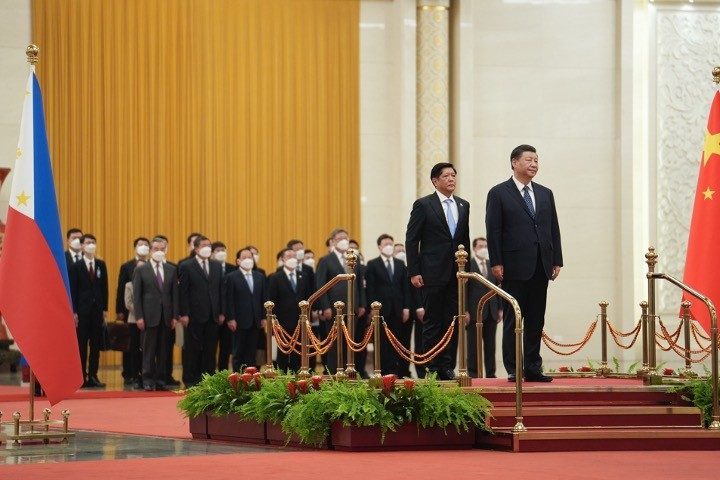
SINGAPORE — China welcomed Philippine President Ferdinand Marcos, Jr. on Wednesday, Jan. 4 with great fanfare, and the two countries inked a deal to alleviate spiraling tensions in the South China Sea and to enhance trade, investment, tourism, agriculture, and clean energy cooperation.
Marcos and his wife were welcomed with a 21-gun salute upon their arrival, and received in Beijing’s Great Hall of the People, where the two presidents walked down a red carpet to review an honor guard.
A state banquet was organized for the delegation in the evening, with former Philippine president Gloria Macapagal-Arroyo, Senator Imee Marcos, House Speaker Martin Romualdez, and Cabinet members in attendance. Macapagal-Arroyo is an old personal friend of Xi’s, and was a surprise member of Marcos’ delegation to China.
Chinese President Xi Jinping told Marcos during their discussions that China was “willing to continue friendly consultations to properly handle maritime problems,” Chinese state media reported.
After the talks, the two leaders signed more than 10 pacts, including agreements on cooperation in agriculture, fishery, infrastructure projects, finance, customs, electronic commerce, and tourism. Furthermore, an accord was set up for direct diplomatic communication to prevent miscalculation and miscommunication over disputed territories in the South China Sea.
Xi stated that “there is great potential for cooperation,” and suggested rebooting negotiations on joint oil and gas exploration in the South China Sea, as well as cooperation in photovoltaic and wind energy and new energy vehicle projects.
Marcos broached the challenges faced by Filipino fishermen who are not able to fish in their natural fishing grounds in the contested waters, the president’s office announced. “I was very clear in trying to talk about the plight of our fishermen and the President promised that we would find a compromise and find a solution that will be beneficial so that our fishermen might be able to fish again in their natural fishing ground,” Marcos said. Both leaders agreed to find a compromise that would be “beneficial” to the Filipino fisherfolk.
The fisherfolk alliance Pamalakaya posited that there is no room for compromise in the West Philippine Sea, as the Philippines already has “legal and political claim over our territorial waters.” “There can only be one solution: China must abide by the International Tribunal on the Law of the Sea that recognizes our exclusive economic zone,” the group stated.
The topic of Filipino fishermen had been among the topics the two countries covered last year during Marcos’ second bilateral meeting with Xi, following their Thailand meeting on the sidelines of the Asia Pacific Economic Cooperation (APEC).
Of Wednesday’s meeting, Marcos said, “We covered so many subjects, many more than are usual for this very formal meeting. In the end, we had fairly detailed discussions which made the meeting run very long. That’s why I’m actually very optimistic because President Xi seems to be genuinely interested in all of these issues and finding a way to move forward to again strengthen the relationship between China and the Philippines,” he added.
Marcos told Xi that his administration is open to working with China to adopt an independent foreign policy that maintains regional peace and benefits both nations. “We agreed that maritime issues between the two countries do not comprise the entirety of our relations, but we acknowledge as well that they remain a significant concern and priority for the Philippines and for the region,” he elaborated.
The South China Morning Post (SCMP) reported that Beijing viewed Marcos’ visit as crucial to preventing “a key member of the Association of Southeast Asian Nations [ASEAN] getting closer to the United States amid the heightened rivalry between Washington and Beijing.”
Marcos’ state visit was his first to China since assuming power in June 2022, and his first to a non-ASEAN country. Xi said that Marcos being the first foreign leader hosted by China in 2023 is evidence of close bilateral ties. Xi also recalled prior meetings with Marcos and heaped praise on his father, Ferdinand Marcos, the authoritarian leader of the Philippines from 1965 to 1986.
“Hopefully, your visit will not only be a ‘trip of reminiscence’ but also a ‘trip of opening future.’ China will always place the Philippines in a prioritized direction for neighboring diplomacy, and to insist on looking at the China-Philippines relations from a height of strategy and over-all situation,” Xi noted.
He also said that the relationship of the two countries is rooted in a regional atmosphere of cordial relations and win-win cooperation. “The Chinese side is willing to focus on cooperation and development with the Philippines and other ASEAN members, and safeguard the centrality of ASEAN in regional cooperation.” He also noted that it would liberate the region from the shadow of the Cold War and bloc-to-bloc confrontation.
Xi recalled that the former communist dictator Mao Zedong and Marcos’ late father jointly made the “historic” decision to establish diplomatic relations in June 1975. Regardless of how Philippine politics has changed in subsequent years, the Marcos family called for cordial China-Philippine relations, Xi said. “This friendship is precious,” he continued. Marcos declared that he would be “opening a new chapter” in the Philippines’ holistic strategic cooperation with China, and pledged to “work towards shifting the trajectory of our relations to a higher gear.”
Addressing China’s parliamentary chairman Li Zhanshu, Marcos said that although there were some disputes between the two countries, these should not be “the sum” of the bilateral relationship.
Notably, Xi proposed joint oil and gas exploration by the two countries in the contested waters of the South China Sea.
Observers noted that Marcos was not being a “pushover” in terms of asserting his country’s claims in the South China Sea. He is clearly “inching away from the extreme pivot to China,” Renato Cruz De Castro, an international affairs analyst at De La Salle University in Manila, said.
De Castro’s views were echoed in comments by Philippine officials, who said that, although the tone of Marcos’ visit was cordial and constructive, he was more resolute than his predecessor Rodrigo Duterte to uphold Manila’s claims in what it calls the “West Philippine Sea.”
Before Marcos visited Beijing, his administration had called for a heightened military presence near the Spratly Islands to counter China, and had also complained to China over the latter’s method of “swarming” disputed islands with many boats, thus blocking access to Filipino fishermen and making them unable to fish in their grounds.
Analysts expected Marcos to leverage on the most recent trip to recalibrate Philippine foreign policy, which under Duterte inched closer to China and away from the United States.
Duterte supposedly moved toward China during his stint as president owing partially to U.S. condemnation of extrajudicial killings and human rights abuses during his clampdown on drugs. The former president had also threatened more than once to sever the 1999 Visiting Forces Agreement permitting U.S. troops to rotate into the Philippines. Eventually, his threats did not materialize.
In an address last May, Marcos pledged he would not lose an inch of Philippine territory to any foreign power. His vow was backed by advocates of a 2016 arbitral ruling invalidating China’s claims in the South China Sea.
Marcos has struck a delicate balance between the United States and China, choosing to visit New York in September to address the United Nations (UN) General Assembly without terming it a state visit. Since his rise to power, Marcos has twice met with U.S. President Joe Biden.
In return, U.S. Secretary of State Antony Blinken and Vice President Kamala Harris visited the Philippines and assured Manila that Washington would defend the country if it were attacked in the South China Sea. Harris said that the U.S. would abide by a 1951 bilateral defense treaty and protect Filipino ships against Chinese aggression.
If the United States and China engage in a conflict over Taiwan, the Philippines could become collateral damage, as it is nearby.
China and the U.S. have been involved in a diplomatic contest for Philippine support. The Philippines regards China as its largest trading partner, but has a defense treaty with the United States, its former colonial master.
China’s state-run Global Times boasted that all tension between China and the Philippines “collapsed on itself” upon Marcos’ visit.
However, although China’s Ambassador to the Philippines Huang Xilian penned in the People’s Daily that Beijing and Manila will “join hands to create a new golden era” for bilateral ties, De Castro expects Beijing will not change its stance on the disputed South China Sea. “At the end of the day, China’s goal is to force us to accept the fait accompli, that they will be operating within our exclusive economic zone,” he said.
Although China’s claims in the region were deemed unlawful by an international arbitration court, it regularly dismisses the ruling and claims almost the entire region, up to an arbitrary barrier concocted by Beijing called the “Nine-Dash Line.” In November last year, a Chinese coast guard vessel intercepted a Philippine naval craft and forcibly obtained Chinese rocket debris it was towing.
Also, despite all the pomp and glamor showcased at Marcos’ welcome ceremony this week, Global Times articulated the consequences that could ensue should Marcos rock the boat and agitate China.
A second Global Times editorial trumpeted Marcos’ visit as evidence that a “golden age” in ties between Beijing and Manila has begun, and “there is little room for outside forces like the U.S. to meddle in the South China Sea situation and interrupt the two countries’ efforts to promote common development.”
Both Global Times editorials reiterated the prospects of joint oil and gas exploration in the South China Sea, framing such an endeavor as Marcos’ reward for not interfering with China’s actions in the contested waters.
If Marcos fails to abide by China’s desires, implied both editorials, he would be held accountable for damaging China-Philippines relations, just as China singled out the administration of Benigno Aquino III in the 2010s for deciding to “provoke China on the South China Sea issue and create a series of conflicts and tensions in the region to serve the U.S. strategy that aims to contain China and interrupt regional peace and stability.”
“The Philippines has learned from the past, and current leaders understand what their country can get from pragmatic and friendly cooperation with China, and what they would lose if they unwisely allow themselves to be used by Washington to contain China,” the Global Times stated.
In light of political and economic pressure from both China and the U.S., as well as domestic calls for Marcos to uphold Philippine sovereignty in contested waters, the diplomatic tightrope that Marcos intends to walk in the near future is going to be very thin and delicate indeed.



